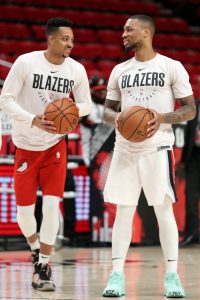While 2019’s salary cap increase wasn’t as substantial as 2016’s, the jump from last season’s $101,869,000 cap to this year’s $109,140,000 represents the second-biggest increase in NBA history.
The luxury tax line increased along with the salary cap, getting a bump all the way from $123,733,000 to $132,627,000 and creating some breathing room for many cap-strapped teams around the league. Still, despite the extra financial flexibility in 2019/20, a handful of teams find themselves above that tax threshold as opening night nears.
Clubs have until the end of the 2019/20 regular season to adjust team salary in an effort to get back under the tax line, and at least one of the teams listed below – the Thunder – figures to push hard to get out of tax territory. But most of the other clubs on the current list of projected taxpayers will have little leverage if they try to dump salary, so it won’t be easy to cut costs.
With the help of salary information from Basketball Insiders and Early Bird Rights, here are the teams projected to be in the tax for ’19/20 as of September 1, 2019:
Portland Trail Blazers
Approximately $12.4MM over tax line
All of the big long-term contracts the Trail Blazers signed in 2016 – for Evan Turner, Allen Crabbe, Maurice Harkless, and Meyers Leonard – are now off the team’s books. However, three of those deals had to be swapped for lucrative contracts belonging to Hassan Whiteside and Kent Bazemore. Throw in huge cap hits for stars Damian Lillard and CJ McCollum, plus an eight-figure salary for Jusuf Nurkic, and Portland projects to have the NBA’s highest team salary for the 2019/20 season.
Since last season was the only recent instance the Blazers have paid the tax, they don’t have repeater concerns yet. As it stands, they have a projected tax bill just over $22MM.
Golden State Warriors
Approximately $5.9MM over tax line
The Warriors‘ team salary falls in between the tax line ($132,627,000) and the tax apron ($138,928,000), which acts as a hard cap for the team this season. Golden State is much closer to the latter than the former, with only about $407K in breathing room below the apron.
That figure assumes Alfonzo McKinnie – who has a non-guaranteed contract – holds the 14th roster spot. The Warriors don’t currently have enough room below the hard cap to start the season with a 15th man.
The Warriors project to have a tax bill in the $15MM range, since they’re subject to repeater penalties after finishing in tax territory in 2016, 2018, and 2019. If not for the repeater penalties, that projection would only be in the neighborhood of $9MM.
[RELATED: Recent History Of NBA Taxpaying Teams]
Miami Heat
Approximately $3.8MM over tax line
Like the Warriors, the Heat are in the territory between the tax line and the apron. Some bonuses push Miami’s total team salary to within approximately $855K of the hard cap (per ESPN’s Bobby Marks), but those incentives won’t count against the team’s cap or tax bill if they go unearned.
Our projection for Miami assumes the team will retain Duncan Robinson and Kendrick Nunn, who don’t yet have fully guaranteed salaries. With those two players and their other 12 guaranteed deals, the Heat would have a projected tax bill a little shy of $6MM.
Oklahoma City Thunder
Approximately $921K over tax line
The Thunder have managed to cut costs significantly so far this summer as they’ve retooled their roster, most notably sending Jerami Grant to Denver in a salary-dump deal for a first-round pick.
Oklahoma City briefly inched below the tax line, but only had 13 players under contract at the time. Signing a mandatory 14th (Justin Patton) pushed the club back into tax territory for the time being. Even after accounting for repeater penalties, the Thunder’s tax bill would be pretty modest (about $2.3MM) if they don’t add any more salary, but I expect the team to do all it can to make a cost-cutting trade to get out of the tax altogether.
Although only four teams project to be taxpayers for now, several other clubs – including the Cavaliers, Nuggets, Pistons, and Magic – are within spitting distance of that threshold.
A rebuilding team like Cleveland will likely be extra careful not to finish the season in the tax –particularly since the Cavs would be subject to repeater penalties. Would-be contenders like Denver may be more inclined to pay a small tax bill if it means acquiring one more impact player for a postseason run.
Photo courtesy of USA Today Sports Images.

Imagine paying tax for a team that wins 20 games
Poor OKC. At least when Westbrook’s current team starts paying luxury taxes in 2021 it will be worth it, unlike all the millions wasted by the Thunder in recent years.
They are in the same boat. No titles. Rockets aint winning a thing with thr 2 biggest ball hogs as their best players.
HWMVP, you are a T-R-O-L-L!
Add Houston to this list post the Nene re-signing (although unlikely they will end the season as a tax paying team given the structure of Nene’s contract and Fertila’s stingyness)